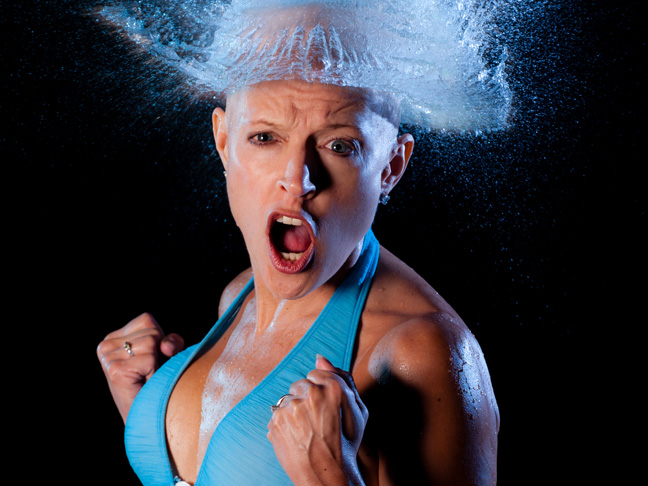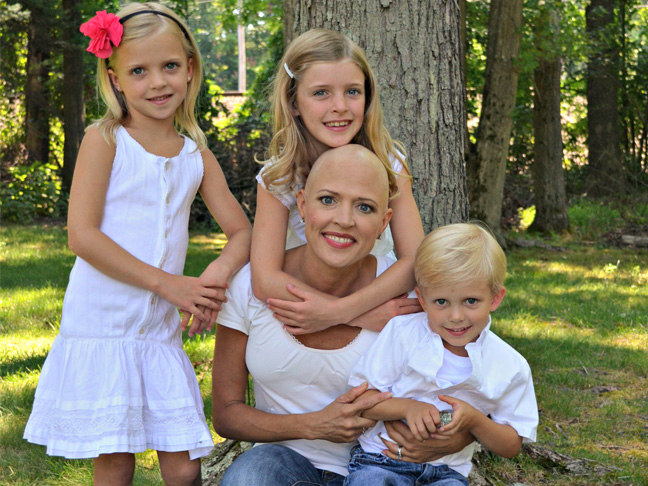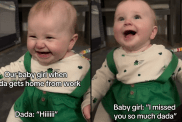We’ve invited moms who inspire us to share their stories with Momtastic for our Super Mom Series. Debbie M. is a mom of three kids who discovered she had breast cancer at the age of 43. By “owning” her cancer, being open and honest, and allowing others to help her, she got through it — and learned valuable lessons along the way.
The day I learned I had breast cancer started off like any other crazy Friday. It was my one “day off” from an intense and demanding technology job for a top investment bank to be full-time mom to my three young children — Allison, 8; Madeleine 7; and Cole, 3. I had just arrived at a special pottery event for my daughter’s kindergarten friends when a nurse from my doctor’s office called. The doctor didn’t like the results from my routine mammogram performed two weeks ago and wanted me to come back and have another mammogram, as well as a breast ultrasound….that day. My stomach sank in fear.
A few hours later, I sat in the doctor’s office completely avoiding the issue by answering work e-mail. Then the radiologist walked in and stunned me with those three words no one ever wants to hear “You have cancer.” My husband didn’t even know I was at the doctor’s office, never mind that I could have cancer.
My first thoughts after this preliminary diagnosis (pre-biopsy): I barely have enough time to go to the bathroom, how am I going to find the time to deal with this? How am I going to tell my husband, my mom and dad, my children, and my siblings? How could this be happening to me? I am only 43 years old. I am fit and eat healthy. I had no family history of breast cancer, nor did I have any risk factors.
I decided not to cancel the family ski trip we had that weekend. Sitting at home worrying about the biopsy results wouldn’t help. I preferred to stay busy and have fun and be surrounded by my family. I also returned to work on Monday.
I took that dreadful call about the biopsy results in the bathroom at work between meetings and forever will hate that bathroom. I was in a state of shock — shaking and crying, unable to function. Luckily a colleague helped arrange a car service and got me to it.
In the car from work to see the doctor, I felt like my world was crashing. I looked at my husband through very teary eyes and said, “I can do this. I am very strong. I can beat this!” And so my journey began.
If I had spent much time thinking about the worst case scenario (or all of the what-ifs) I could have easily been crippled by fear. Instead, I decided to take things one day at a time. I also chose to “own” my cancer by taking charge of beating it. My husband and I researched what doctors to see, what hospital to go to, and what treatment options to seek. We quickly learned that what works for some people with breast cancer may not be the best option for others. It would be important to choose an option that was best for me.
My cancer was early stage but aggressive (HER2+ for those many of you in the know) and would mean hormone therapy and chemotherapy, as well as surgery. I would lose my hair and my breasts. The thought of losing my breasts was terrifying, but I think the idea of losing my hair was almost scarier. My size 32A breasts were nothing to write home about so we joked that if I was going to go through all this, at least I would get nice new big boobs during the reconstruction process.
We decided not to tell the kids about my diagnosis until we had a treatment plan. They were young and we wanted to manage their fears as best we could. Choosing the right timing, key messages, and words were very important to me. When we finally did tell them, we kept the message simple, and we delivered it a week or so before my surgery. We did not talk about chemotherapy and hair loss until later when we knew for sure that chemo was part of our plan.
My kids handled the news surprisingly very well. They were so young that they did not really understand. I was so proud of my kindergartner who when asked by a classmate, “Is your mom going to die?” replied, “No, she has the best doctors in the world.” Perhaps because of that awful exchange, she became more and more anxious as my treatment progressed. I initially thought that her anxiety was caused by the stress of competitive gymnastics but now I realize it was a delayed reaction to my illness on top of the pressure from gymnastics.
On April 1, 2013, I had a double mastectomy. They scooped out my breasts — at least that’s what it felt like afterwards. I didn’t realize how intensely worried my husband was until I saw him skip into my recovery room after surgery to say, “Great news, the cancer has not spread.” Although I was woozy from the meds, I swear he grew a whole foot taller as if a huge weight had been lifted from his shoulders.
About six weeks post-surgery, I started 16 weeks of chemotherapy. I was as terrified as anyone would be of having horrible poisons injected into my body. I traveled two hours each way from suburban New Jersey to Sloan-Kettering Memorial Hospital in New York City for hours of treatment. Afterwards, I’d have two good days — I was doped up on steroids to prevent allergic reactions to treatments — and then a rough three to five days of feeling like I had the flu. I was very tired and achy, with numerous other “fun” side effects. My husband even had to give me an injection after each treatment to boost my immune system. I‘d recover just in time to start the cycle all over again.
I also started the process of having my breasts reconstructed. I’d get an injection every two weeks into each breast to fill the tissue expanders to slowly stretch the muscle, tissue, and skin to be able to eventually hold permanent implants. Despite my husband’s desire to get “maximum fill,” I knew they were expanded enough when my 3-year-old suddenly shouted “Mom, your boobs are getting bigger!” during a nice Sunday family dinner.
Although I was tired, uncomfortable, and in pain, I spent as much time as I could with my children. The news that I was going to lose my hair was more traumatic for them than the news that I had cancer. It was a visual reminder that I was really sick, and now everyone who saw me would know it. Their biggest worry: “You’re not going to walk us to school bald, are you?” Cause after all, this was ALL about them! I wanted them to be a part of the experience so they would not be afraid or feel like we were hiding anything. Maybe this would teach them how to tackle hard things in their lives. I told my kids they would have an once-in-a-lifetime opportunity to do ANYTHING they wanted to my hair. They cut it, colored it with colorful hairspray, and added dozens of barrettes. It was an amusing family event that we even shared via FaceTime with my parents and brother’s family.
Two days later, a close mom friend took me to get my head shaved. Like naughty teenagers, we shared a bottle of wine in her minivan in the parking lot of the salon before the big shave. She took photos and held my hand when I cried. When I got home my 6-year-old, who is far more empathetic then the average 6-year-old, gave me the biggest hug and said “Mom you are beautiful anyway and I still love you!” And my little 3-year-old just loved to pat my bald head and giggle, lightening my heart.
My mom traveled multiple times from Ohio to spend three to four weeks at a time with me, and my mother-in-law took me to many of my chemo treatments. They sacrificed their own time to help me. They were worried, very supportive, and extremely helpful. They somehow knew what I needed and when I needed it. While watching them help me, it occurred to me that seeing my own child going through cancer would be much harder than going through it myself. I was also struck by the realization that being a mom never ends, no matter how old your “child” is.
I had additional family support as well. My brother Gary also traveled from South Carolina to New Jersey to see me during chemo and capture this memory of strength and endurance and inspire me to fight through it:

At work, my boss and colleagues could not have been more supportive during my time out on disability. I eventually went back to work before my last surgery. It wasn’t easy given my ongoing treatments and regular doctor visits but work needed me, I missed it and we needed the money especially given the medical bills.
In addition to leaning on close friends and family throughout my ordeal, I chose to be open about my diagnosis and treatment with the rest of the world. I shared my progress on Caring Bridge to keep friends up to date but more importantly to help bring awareness about breast cancer to others. I even included pictures of my kids cutting my hair, my head being shaved, and other bald pictures. I approached my cancer much like I do most challenges in my life — with openness, determination, and with a positive attitude. My approach may not work for everyone, but it certainly helped me get through one of the hardest periods of my life — as did the love and support from my friends and family.
I am done with chemo and my surgeries, and I am nearly finished with Herceptin treatment (hormone-therapy). I will, however, be on a daily oral drug for the next decade to help prevent recurrence. My hair is still short but growing back quickly — and it has actually been kind of nice not having to spend so much time styling it every day. By accepting and “owning” my cancer, being open and honest, and allowing others to help me, I got through it.
I will never let cancer define me, but it will forever affect how I look at life. I continue to attend support groups and now even participate in The Livestrong program with other cancer survivors. I will continue to look for ways to help and inspire others in my situation — whether through my stories, volunteer work, or my next career. I recently chose to leave my wonderful firm after a decade to spend more time with my kids and to plan for the road ahead. I don’t know where that road will lead yet but I do know I can navigate any road in front of me. I also know my family will continue to focus on being healthy: eating well, getting enough rest, working on reducing stress and anxiety, and making time to just “be” rather than “do.” After all, we only get one life!
Photographs: Christen Simmons (top); Gary Coleman, www.colemanphotography.com (middle)








